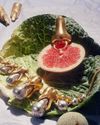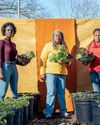In an arcane West Malaysian district, two secluded resorts show the poignant impact travellers can have on both the destination’s surrounding environment and the communities they visit.

TANJONG JARA RESORT
“THIS IS OUR first tree. It’s simple but it’s symbolic,” Qarl, the resident naturalist of Tanjong Jara Resort, remarked as he trudged ahead of me, gesturing towards a haphazard mangrove tree rooted in a small river running under the wooden bridge we were crossing on. Three peacocks, oblivious to our presence, lazed under the nearby shade of lofty palm trees. “It’s called Dungun, the name of this district itself.”
I was in the middle of Tanjong Jara Resort. The coastal retreat is perched on the northern tip of the fishing port of Dungun, in Terengganu, on peninsular (West) Malaysia’s east coast. Verdant and expansive, it sits on 17 hectares of grounds along the crescent of a quiet, golden sand beach. Tanjong Jara was formerly a 17th-century residential compound for the
AS THE EARTH continues to crumble in favour of environment-taxing modernity, the global collective is increasingly pitching in with efforts to de-accelerate the inevitable destruction of Mother Nature. In this age of rising eco-consciousness, the notion of “sustainable travel” has gained traction within the tourism sphere.
Diese Geschichte stammt aus der August 2019-Ausgabe von T Singapore: The New York Times Style Magazine.
Starten Sie Ihre 7-tägige kostenlose Testversion von Magzter GOLD, um auf Tausende kuratierte Premium-Storys sowie über 8.000 Zeitschriften und Zeitungen zuzugreifen.
Bereits Abonnent ? Anmelden
Diese Geschichte stammt aus der August 2019-Ausgabe von T Singapore: The New York Times Style Magazine.
Starten Sie Ihre 7-tägige kostenlose Testversion von Magzter GOLD, um auf Tausende kuratierte Premium-Storys sowie über 8.000 Zeitschriften und Zeitungen zuzugreifen.
Bereits Abonnent? Anmelden

Look At Us
As public memorials face a public reckoning, there’s still too little thought paid to how women are represented — as bodies and as selves.

Two New Jewellery Collections Find Their Inspiration In The Human Anatomy
Two new jewellery collections find their inspiration in the human anatomy.

She For She
We speak to three women in Singapore who are trying to improve the lives of women — and all other gender identities — through their work.
Over The Rainbow
How the bright colours and lively prints created by illustrator Donald Robertson brought the latest Weekend Max Mara Flutterflies capsule collection to life.

What Is Love?
The artist Hank Willis Thomas discusses his partnership with the Japanese fashion label Sacai and the idea of fashion in the context of the art world.

The Luxury Hotel For New Mums
Singapore’s first luxury confinement facility, Kai Suites, aims to provide much more than plush beds and 24-hour infant care: It wants to help mothers with their mental and emotional wellbeing as well.

Who Gets To Eat?
As recent food movements have focused on buying local or organic, a deeper and different conversation is happening among America’s food activists: one that demands not just better meals for everyone but a dismantling of the structures that have failed to nourish us all along.

Reimagining The Future Of Fashion
What do women want from their clothes and accessories, and does luxury still have a place in this post-pandemic era? The iconic designer Alber Elbaz thinks he has the answers with his new label, AZ Factory.

A Holiday At Home
Once seen as the less exciting alternative to an exotic destination holiday, the staycation takes on new importance.
All Dressed Up, Nowhere To Go
Chinese supermodel He Sui talks about the unseen pressures of being an international star, being a trailblazer for East Asian models in the fashion world, and why, at the end of the day, she is content with being known as just a regular girl from Wenzhou.